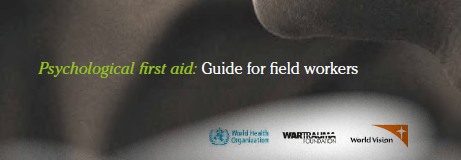Look – Listen – Link | Psychological First Aid
![Psychological First Aid [Maksym Kaharlytskyi via unsplash]](https://michaelkimmig.eu/wp-content/uploads/2022/03/Psychological-First-Aid-Maksym-Kaharlytskyi-via-unsplash-873x450.png)
Look – Listen – Link – a way to provide psychological first aid (PFA) – is not something that can be done only by professionals. Everyone of us can meet someone who experienced an extremely distressing event: a car accident or fire, an act of violence, a major disaster, an act of war. PFA aims at ensuring feeling safe and connected to others, providing access to support and encouraging self-help of individuals and communities.
S Shortly after the invasion in Ukraine, I started to look for resources on crisis intervention. Preferably something that could be applied by everybody to support people who have experienced serious crisis even or an extremely distressing event. This might concern people who spontaneously drive to the border to pick up refugees, volunteers helping in a major disaster, as well as a person who arrives first at the scene of an accident or a teacher or a community worker working with someone who has just witnessed the violent death of a loved one. One of the reoccurring terms that popped up was psychological first aid.What is psychological first aid?
Psychological first aid (PFA) describes a humane, supportive response to a fellow human being who is suffering and who may need support.
Psychological first aid: Guide for field workers, p.53
PFA is not something that can be done only by professionals. At the same time it is not professional counselling or psychological debriefing. PFA aims at ensuring feeling safe and connected to others, providing access to support and encouraging self-help of individuals and communities. It is about
- providing practical care and support,
- assessing needs and concerns and helping them address basic needs,
- listening to and comforting people in order to feel calm,
- helping people connect to information, services and social supports,
- protecting people from further harm.
Providing PFA responsibly means:
- Respect safety, dignity and rights.
- Adapt what you do to take account of the person’s culture.
- Be aware of other emergency response measures.
- Look after yourself.(Psychological first aid: Guide for field workers, p.53)
Download: Psychological first aid. Pocket Guide
Look – Listen – Link
Preparation
There are (at least) three things you can do to prepare yourself before jumping into action:
- Learn about the crisis event.
- Learn about available services and supports.
- Learn about safety and security concerns.
Action Principles
Giving psychological first aid is something everyone of us can do. It’s about three things: looking, listening and linking:

Ethics
Ethics are guidelines to avoid causing further harm to the person we want to help. They help us to provide the best care possible and to act only in their best interest. The following guidelines might mean different things in terms of your cultural context.
Remember: PFA might not be enough. People who need more advanced support immediately are:
- people with serious, life-threatening injuries who need emergency medical care.
- people who are so upset that they cannot care for themselves or their children.
- people who may hurt themselves.
- people who may hurt others.

Download: Psychological first aid. Pocket Guide
Where can I learn more?
Where can you learn psychological first aid? There are many courses offers out there focussing on different approaches and target groups. If you cannot find something in your region, you might want to check out the following online courses:
Psychological first aid | coursera
Learn to provide psychological first aid to people in an emergency by employing the RAPID model: Reflective listening, Assessment of needs, Prioritization, Intervention, and Disposition.
Johns Hopkins University / Coursera
Psychological First Aid: Supporting Children and Young People | futurelearn
Get Psychological First Aid training to support children and young people’s mental health during emergencies and crisis situations
UK Health Security Agency (UKHSA) / futurelearn
Principles of Psychological First Aid | disaster.ready
Recommended for first responders and service providers who may interact with people affected by a crisis, this online course covers supportive listening, normal stress responses, positive coping mechanisms and the importance of linking people to support disaster.ready.org
Source
Psychological first aid: Guide for field workers by World Health Organization, War Trauma Foundation and World Vision International, 2011
Psychological first aid. Pocket Guide by World Health Organization, a 2 page summary of the guidebook “Psychological first aid: Guide for field workers”




![MuC Mentoring Competence Framework [title slide]](https://michaelkimmig.eu/wp-content/uploads/2024/12/MuC-Framework-title-520x245.jpg)